Tsara Shelton's Blog, page 6
October 5, 2022
Autism Answer: He Will Make a Great Dad
I love a world that celebrates great parents. Working ones, stay-at-home ones, quiet ones, struggling ones, silly ones, older ones, strait laced ones, single ones, partnered ones, funny ones, young ones, adopted ones... parents have so much power. I love when we care little about the labels and a lot about love, evolution, and all encompassing caring.
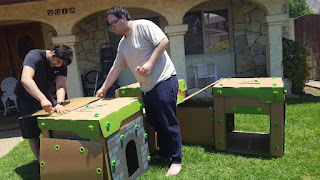 Shay building fun stuff for the kids with his brother, their dad
Shay building fun stuff for the kids with his brother, their dad
September 24, 2022
Autism Answer: Without Wings (Short Story)

It was all inside. The nourishment, the entertainment, the company. The sharing of ideas, the music that swayed and swelled and invigorated those ideas, the others with their news and affections. It was all inside today. Platforms rested at open WIWS (Walk In, Wing Span) windows while individuals, groups, families flew up, landed, went inside. Simply went inside. Wanting to go inside, to have what was inside, I wandered around, looking for the special entrance made for me. For others like me. While looking for my entrance, I couldn't help but also look for someone similar to me; another someone needing the special entrance. I looked partly to remind myself that I was not alone, and partly to follow them in as I couldn't seem to find the entrance myself. I wasn't in a hurry. I'd gotten here early knowing that sometimes getting inside takes me a little longer than the others and I did not want to feel anxious about time. Plus, I have to pay attention to the places I put my feet in order to stay safe, and I like having time to stop and look up at the world. So I am here early. As are those I see entering welcoming WIWS windows now.
Often our special entrances would be signed clearly, often not, but usually there is at least one for buildings such as this, and I really wanted to be part of what was inside, so I kept looking. The ground is not easy to traverse because, well, most others simply fly over the rough stuff. So it isn't cared for in the way it could be. Admittedly, there are a lot of people like me, but many of us don't often find the desire for what's inside and up high worth the work of getting to it. Today, I do. But as others fly up to the busy perches, move swiftly into the open windows, the sound of chatter and music raining lightly down on me, I see they are mostly too busy or rushed to notice me, to offer assistance. They aren't cruel; they are simply on their way somewhere and focused. I don't want to interrupt their flow so I continue climbing over obstacles and seeking a sign for my entrance. I don't ask for help up. I have still not seen another like me today, and can't help but wonder if I am being too insistent on taking part of what is inside. I mean, after all, once I do find the entrance and make my way to the gathering of wonderful things up high, will it really be so wonderful? I'll be tired, they'll be busy, I'll have to find my way back down. But, I remind myself, by then I will know where my special entrance is at least. And this cumbersome ground is simply that. Cumbersome. Challenging. Not impossible. I can do it, I have done it, I will do it. Today, I want what is inside. Today, I want access to wonderful companionship, nourishment, ideas. Someone smiles at me as they fly by, nodding and moving swiftly upward. I think I see them point in the direction I'm walking... Oh, I see it! Barely fifty feet away, beyond a noticeable crack in the ground I know I can make my way across. The crack is not too large, but it is large enough that I see it before tripping into it. It is simply a hop for me when I get there. I see the sign "Without Wings" above a lovely little door leading inside. I know today will be worth it. I will open the door, which should be unlocked, and head up the stairs, which I know will be in okay condition - the laws insist they be safe enough - and though I'll be tired by the time I reach the floors above where everyone is gathering for today's meeting - an important meeting meant to discuss and decide important things - the ideas, nourishment, and music should help perk me up rather quickly. Once inside I know I will require a modicum of assistance, some help having access to things available on higher perches and platforms. Places like this are designed by those with wings so why would they not incorporate all that space up high? For people like me, though, they will kindly help. In fact, in most instances, they will like to help. In general, we all like an element of helping. I, unlike the majority, am without wings, and I am here. I intend to add my ideas to the others. To let my ideas fly, without wings but amongst them. Today, for me, it is worth it. I feel certain of it. Hugs, smiles, and love!!Autism Answers with Tsara Shelton (Facebook)
September 2, 2022
Autism Answer: Teeth Aren't Supposed to be Bright White
I feel like the whole "having white teeth is better" fiasco is an example of a lot of things that simply go too far. Things that go from misinformation to disinformation. Yes, teeth are stained by things we eat, drink, and do. Smoking stains them for sure. So can my beloved coffee. Also, malnutrition breeds less healthy everything, including teeth. As does poor mouth maintenance, leading to discolored teeth. This feeds the misinformation that white teeth, then, must be clean cared for teeth while yellow teeth must be stained neglected teeth. Then, when people start selling tooth whitening products, the misinformation turns to disinformation. The advertisements insinuate that, clearly, you want whiter teeth because those are better, so here's why you should get those whiter teeth with our product. Everyone we like to look at on our screens has white teeth, unless they are the homeless one, or the junkie. Etc. We are purposely sold the lie that the whiter the smile, the cleaner and better and more successful and healthy is the person behind the smile. I know, I know, it's silly. It's not a big deal. Whiten your teeth if you want to. I continue to smile easier when I know my teeth are whiter. But it's too bad, isn't it? Wouldn't it be cool if we all agreed that teeth can simply be healthy? Not have to look a certain way to prove it? Let them be missing, crooked, far apart, crowded. Fix the stuff that makes it harder to be healthy, let the rest be beautiful in it's own right. That would be nice. And more affordable.
When my brother smiles big, when he makes direct eye contact and gives a huge from the soul of himself grin, it is bloody gorgeous! Those far apart yellow teeth of his rival the sun for the light they bring into a room. Hugs, smiles, and love!! Autism Answers with Tsara Shelton (Facebook)
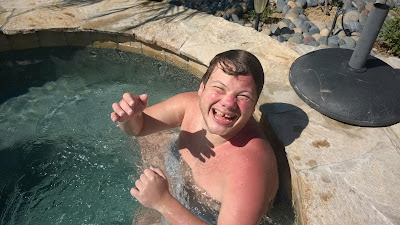 My brother, Dar, in a pool wearing his gorgeous grin
My brother, Dar, in a pool wearing his gorgeous grinAugust 16, 2022
Autism Answer: Ample Breasts
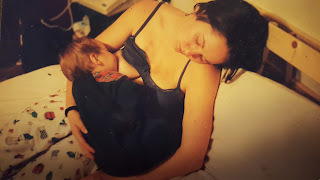 Me sleeping and breast feeding
Me sleeping and breast feeding "Can I give feedback that's personal?" "Of course, that's pretty much the feedback she wants. While you read the manuscript make note of where you get bored, if you feel confused, where it seems redundant, and especially any personal reactions to the story. That's totally interesting and useful to her." "Okay. Like, when she writes about granny's ample breasts, that's yucky. That's not something the reader needs to know, it's yucky." Meagan, an eighteen year old college student, was reading and reacting to the first draft of my mom's upcoming book, the true story of a woman with multiple personalities. A woman my mom is living alongside and becoming good friends with. [If you have not already read some of my mom's published books, I highly recommend them! Follow this link to have a peek... of her books... not breasts... tee hee!: Lynette Louise, The Brain Broad, Books ]
Granny's ample breasts are, in fact, a relevant part of the story. "Did you just read that now?" I asked, wanting to know if she was reacting simply to any talk of "ample breasts" or if she'd continued reading and still didn't see the relevance. "Yes. It's yucky, mummy." I was chopping veggies in the kitchen and Meagan had just come down from upstairs where, clearly, she had begun reading the book and was now feeling, well, yucky. "I don't think it's yucky. In fact, I think of that part often. I loved the image of a woman baking in her kitchen adeptly, after years of honing the skills necessary. Including contending with her ample breasts. They are in the way, they are heavy, and they are part of her. In fact," I added, while moving the chopped veggies from my cutting board to the skillet on the stove, not at all having to contend with my own not-so-ample breasts, "as you continue reading you'll discover that for many characters in the family, ample breasts are a relevant aspect of the story." "Oh, so there's a reason for mentioning her boobs? That's different. I didn't know there would be a reason." "Honestly, there's a reason for everything you'll read. But that doesn't mean mom won't want to know how you felt. She wants to know, for sure!" "Okay, well I thought the ample breasts part was yucky." "And yet you are the one telling me you want to have a skinny body with ample breast," I teased. We giggled. She was getting herself a bowl of cereal while I was making a stir fry and as we moved fairly smoothly around each other in the kitchen, I added, "You know, granny would have had a harder time sharing a small kitchen with another person. Her ample breasts took up enough space as it is. And since people sometimes find ample breasts yucky she might have felt self-conscious and awkward and, in fact, told you to leave." We giggled again and Meagan went back upstairs to continue reading. Can you imagine how much it could hurt if you were told it is yucky to talk about how you have to manage your own body? If you have a disability or difference that is natural to you but uncomfortable to others and you are told, or lead to feel as though, it is yucky to hear about? When I was in grade eight I knew this girl, Roxanne. She had dark hair and olive skin. She was pretty and petite. And when I met her, her breasts were huge. She dressed to try and hide them, her posture attempted to do the same. But there was no getting around them. They were more than ample. She had to get a reduction, the first time I ever heard of such a thing. We knew, or at least I know I knew, there was so much more to her than her breasts but when we saw or talked about Roxanne, it was about the breasts. We were forever offended or interested in or otherwise occupied by the fact of her breasts. Even now when I think of Roxanne, I wonder how that must have been for her. Still, it is about her breasts. Now, I was not a friend of hers. I merely knew her. My bet is that her friends think of her more completely. Her family as well. But that does not mean her breasts were not part of her story. They obviously were. You cannot have something that drastic be unimportant in the story of you. Certainly it can be something that isn't impacting you later in life, I'm not saying we can't get past our past, I'm simply saying that telling the story of who we are involves the story of things we dealt with, including our bodies. For many of us, our bodies didn't give us much out of the ordinary to manage or deal with. Which is why, I think, we might find it yucky to hear about people who do have much to manage or contend with in their own bodies. But we should probably not let the knee jerk reaction of "yucky" stop us from learning more. From caring to care and listen or read on. When someone includes their ample breasts in a story it is likely because that is a relevant part. Not simply to shock or sensationalize. Though, yes, that can be the case too. Which, of course, can also add something relevant. Learning why we are wanting to shock, or why we are feeling shocked. I turned off the stove, scooped some rice and veggies into a couple of bowls, and as I carried the food upstairs to where my love was working I caught myself wondering, would he be pleased if my body had ample breasts? Does he wish they were at least a little more ample? Should I wish they were ample? Interesting. Turns out not-ample breasts can take up space, even if it's only in my head.
 Hugs, smiles, and love!!Autism Answers with Tsara Shelton (Facebook) Random Addition: I included the pic of me breast feeding only because as I was thinking about what type of pic to use for this post, scrolling through my photos, I came across that one. It reminded me that I have had ample breasts before, when feeding my babies, which actually gave me an experience that helped me understand the relevance of the breasts in the story. When my boobs were full of milk they were in my way, they attracted a different kind of attention (not just by their size but also my comfort with their function as food for my babies), they were heavy and sore, they were something I had to contend with. These kinds of experiences can help us find empathy. At first, in the specific places where we have experiences but as we get older and have more exposure, we can better generalize and understand and believe in the experiences shared with us by others.
Hugs, smiles, and love!!Autism Answers with Tsara Shelton (Facebook) Random Addition: I included the pic of me breast feeding only because as I was thinking about what type of pic to use for this post, scrolling through my photos, I came across that one. It reminded me that I have had ample breasts before, when feeding my babies, which actually gave me an experience that helped me understand the relevance of the breasts in the story. When my boobs were full of milk they were in my way, they attracted a different kind of attention (not just by their size but also my comfort with their function as food for my babies), they were heavy and sore, they were something I had to contend with. These kinds of experiences can help us find empathy. At first, in the specific places where we have experiences but as we get older and have more exposure, we can better generalize and understand and believe in the experiences shared with us by others. August 12, 2022
Autism Answer: Watch Your Words (Where They Come From and What They Do)
This piece was originally published on Disabled World
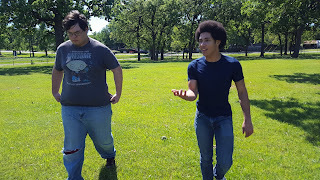 My two youngest sons walking and conversing
My two youngest sons walking and conversing
Language matters, full stop.
However, it doesn't follow that we have to use the right words.
The power of language is more about knowing our words are tools we use to share something grander than the words themselves. Hence, they - our chosen words and phrases - are fantastic clues to what we think and believe as well as powerful influencers. Different cultures have different histories with words. Different families have different histories with words and phrases. And different people have different histories.
If we tell someone who is autistic that they, in fact, are not autistic but rather have autism, we may be shutting them down in ways we don't understand. However, if we are in a position to communicate with that person and share that thought, that we see a difference between being something and having something, we open up the potential for powerful insights. For all of us. (BTW: My brother is autistic. :D )
If you ask me, "What's wrong? You look sick," because I look sick to you but I feel completely fine and your question has me feeling like I look tired and ugly, it is because words are powerful. But you didn't use the wrong ones. You reached out and cared. I can react by suddenly feeling tired and ugly (a reaction I've had) or by telling you not to say "what's wrong" because those are wrong words (a reaction I've been tempted to have) or by taking time to laugh at how tempting those reactions are simply because you asked what's wrong and thought I looked sick (a conversation I've had). You might then giggle with me and continue to reach out to people by asking what's wrong. Or maybe you'll shift your language but still reach out. Or maybe you'll be afraid to reach out at all.
Again, it's just plain truth that words and phrases matter. From the small everyday framing (What a horrible day vs what a difficult day vs what an exhausting day, etc) which infect our moods and influence our behaviors, to the ones we love to argue for or against in certain circles.
When we argue against a word or phrase it's usually because we understand the harm a history has done with that word or phrase at the helm. We start having epiphanies and intense realizations about the word and how insidious it is. We want to throw it away and grow an entirely new way of seeing and speaking. When we argue against freaking out about certain words and phrases it is often because we have loved ones with different histories, we have seen too many people hurt by being afraid to use the wrong phrases, and we care about including everyone.
Also, sometimes we argue for or against because it sounds smart or righteous and we aren't thinking much about it at all.
I love a lot of people who are a variety of disabilities, orientations, histories, and colors. Some speak and some do not. They all want to communicate and have various challenges doing so. We do our best work when we pay attention to where the communication is coming from. Where the words are coming from and how they are affecting our beliefs and the inclusion of people around us. Languages are different around the world and words are not right or wrong, but the meaning behind them, the influence they have on how we treat each other and ourselves, is indeed real.
It is a wonderful idea, sharing how we feel about the words people use around us. It is a wonderful idea, being willing to shift our language when we recognize it as growing out of a belief that is unkind. It is a wonderful idea. It is wonderful.
Language evolves anyway and getting involved in that evolution in order to be a thinking person who is aware of the influence it has on us, as well as the clues it offers to who we are, is meaningful.
Language is a wildly interesting and powerful thing. It would be sad, I think, to shut down conversations about it entirely. But to shut down people for the words they use is also sad. My brothers use the word retarded easily and comfortably (they are aware of the diagnosis from their childhoods) and it looks good on them. They are not name calling, they are talking about themselves and sharing insights. When someone tries to tell them retarded is a wrong or bad word, they confess to feeling shut down and shot down. [My mom wrote these two wonderful posts that highlight the brilliance of my brothers when using socially unacceptable words and behaviors: Reality Retarded and Before You React, Read On ]
However, when I've talked to them about why some people say that about the word, we have fabulous conversation. And they understand it, but don't agree. At least not at the moment, and not for them. And that's because they are thinking people taking the time to follow clues about where their words come from.
So let's pay attention to language. Let's share what we're discovering along the way. Let's watch our words. But more than the words themselves, let's watch where our words are coming from and what beliefs and behaviors they are fostering.
Hugs, smiles, and love!!Autism Answers with Tsara Shelton (Facebook)August 2, 2022
Autism Answer: Pick up the Trash
 A cloudy sky pic my son took nearly ten years ago
A cloudy sky pic my son took nearly ten years agoThe morning is dark, overcast, rain falling heavy for a moment then sitting in wait the next. I'm walking - coffee in hand - along the river. The crashing of waves on the rocks is my music. I'm staying near the cover of trees, prepared for the moments of hard rain. I am not alone. Surrounding me are busy squirrels and seagulls. The wildlife is close, but not scary close. I love this. I see something on the rocks and recognize it immediately as a discarded mask. They are everywhere lately. I'm deeply enjoying the sound of water, the feel of the morning air, the smell of rain, the animals that are giving me my space while I spend time in theirs. Even the sound of a few cars driving past on wet pavement enhances the feeling of quiet joy for me. The mask bothers me and, for a moment, I want to walk a little ways away rather than pick it up and take care of it. I want to ignore it and simply pick a different spot to stand by the water where the mask can be easily forgotten. But, I don't. Me and my coffee carefully make our way down to the litter, on the potentially slippery rocks, and pick up the mask. It's soaking wet but new looking, and I consider keeping it. My "reuse" reflex responds in this way often, and sometimes I agree with it. Often when I pick up trash I discover it is not even trash. But, not today. I will throw it away. There are so many trash bins here it's a simple thing. Heading to a bin I notice my moment has been changed. I no longer feel the same sense of peace, calm, and joy I had been oh so deeply enjoying. It had been a delicious moment, until that mask. And I could have walked a small ways away to continue the feeling. I could have easily forgotten the mask. I mean, it's one mask. I didn't save the world by picking it up. Pollution is still a thing. Heck, there wasn't even anyone there I was being a good example for. It was just one girl choosing to pick up one piece of trash rather than ignore it because it interrupted her moment of joy. Not allowing joy to be harmed is often the right choice. A choice that is different than not allowing it to be interrupted or shifted. My walk to the trash bin brought me farther away from the sound of water, toward the playground where I had parked my car. I tossed the mask and stood still for a moment. Which direction should I move now? Back to the water and attempt to recapture the sensory delights I had been immersed in, or toward the car where my mobile office waited and work wanted to get done? I chose the different joy of getting work done. My walk through the playground toward the car brings visions of my grandchildren to mind. I imagine bringing them here while their fathers (my sons) get work done. I imagine the little ones running around filled with joy while I play alongside them, thrilled to be a part of their lives. Thrilled to be part of my son's lives and able to help them get work done. It is a joyful imagining! A separate kind of fun from the quiet peaceful moment interrupted by the mask. But still lovely. Also, imagining the grandbabies reminds me of why I like to pick up the trash. For the future. When I see it, something that should be cleaned up in order to not hurt someone or something in the future, that's the time to act. If I ignore it, it might fester. If I just don't want to do it and tell myself I'll do it later, I may lose it or forget. Now, if the rocks had been dangerously slippery, I would have not picked up the mask. Sometimes you see it, the trash, but it is not the right time to clean it up. Timing matters. I usually know when I'm avoiding something because I just don't want to take care of it vs when I'm waiting for the right time. Waiting for the right time is part of taking care of it, though. It is proactive. It is aware. Heck, sometimes it is enough. The shifts in behavior that happen while being aware sometimes clean up the trash. The morning is still dark, the rain is heavy now. I'm sitting in the car near a library while water pours down around me. The busy squirrels appear to have hidden in the trees. An airplane is roaring overhead and my mind soars with it, wondering when the next time will be that I fly somewhere. Will it be to visit my grandkids again? Or will it be to travel for the first time with my love to his long ago home, in Australia? A place I've not yet visited. I picked up trash that threatened, in a small way, the future. It was not what I felt like doing at the time. It shifted my mood and interrupted my joy. I love this. Hugs, smiles, and love!!Autism Answers with Tsara Shelton (Facebook)
July 21, 2022
Autism Answer: Don't Judge, But Also Do Ask For Change
 A pic of my oldest son with words he wrote about judging
A pic of my oldest son with words he wrote about judging
I know, I know, I know: if I'm not judging you then I must be okay with everything you do, right? I mean, I don't judge. You do you.
Sometimes, that works fine. If I'm not judging you I can still choose to walk away, to judge your behaviors and beliefs as not for me, not my jam.
But what about my kids? My grand-kids? My closest friends and family? Do I just let them do whatever the heck they want without asking for, teaching, and insisting on change? Nope. Obviously that doesn't make sense. It doesn't connect us, it doesn't help us help each other.
And it sets us up for being abusive and being abused.
It's often not easy or obvious, and for sure for sure for sure mistakes will be made, but if you can remember that asking for change, or teaching a different way to be, is not inherently judgmental, critical, or fault-finding. It can be, when you are being intolerant and hence telling a person to be a different person. But it isn't true that if you are not a judgemental person you won't ask people to shift, change, grow.
In fact, as you expect and ask yourself to shift, change, and grow you may notice you do your best work when not sitting in judgement of yourself but rather seeing where your habits, behaviors, and beliefs are hindering or hurting you and trusting yourself to make changes. It is beautiful. It is an evolving of yourself that you influence by not hating something about you but, rather, choosing a new thing. When you are busy hating a thing about you, you keep it alive. You feed it and give it power. When you just see it as a hindrance, or something you were mistaken to believe, or something that once helped you but now hurts you, you more easily move on. (Er, more easily. Not always easily.)
We can do that with our loved ones. Growing up with autistic brothers gave me a unique perspective. Actually, it was growing up with autistic brothers and a mom with unique perspectives that gave me a unique perspective. But I saw first hand the differences between experts being fake nice with my brothers, judging them as less than or broken inside, while trying to force them to be different people vs my mom who saw them as born beautiful, burdened with overwhelming challenges, finding ways to handle those challenges that were less than desired, and worth all the hard work and curious nature she could muster to help them be them, but in healthier safer ways. She raised the bar with my brothers and insisted they could be successful, she was almost merciless in her insistence, but she always considered who they were and what they wanted as she did so.
It's hard to explain the difference, but it is all the difference. Seeing people as generally awesome inside, navigating their world, the world their body and environment provides, and probably needing help from others along the way, is a non-judgemental view. We all need help from others along the way. Which is wonderful. That's how we learn about others.
Seeing different people with different styles as different rather than wrong is what we're after, I think, but that doesn't mean we can't ask for change. For growth.
Silly example:
When I was thirteen my mom confronted me about something, I don't remember what, but I know it had to do with my behavior at the time. I responded in a fun way. I chose to punch her over and over again on her thigh while screaming, "I hate you! I hate you! I hate you!" I was mature for my age. tee hee!
Anyway, she didn't say it was okay for me to do that. But she also didn't think I was bad or wrong for doing that. She reached into my torment and asked why I was doing that, made sure I knew I must never again do that, and helped me figure out a different way to navigate my pain. (Our pain? I did punch her.)
This. This is what it can be to love someone without judgment but with expectations of change.
It worked, too. I never said mean things to her ever again. (Mom, if you're reading this, pretend with me, kay? giggle!)
This is my long winded way of attempting to remind us of the thing I often need reminding of: It is okay to ask someone you love to change. It is okay to ask someone, including yourself, to be different. It is more than okay. It is what love often looks like. It is necessary, I believe, to practice knowing when to do so and knowing not to hate or think bad and wrong of the person, or even the behaviors, you are hoping to change. The behaviors are all symptoms and clues. The person is the seed within.
Also, it is necessary to practice being open to the possibility that we ourselves are the one who may want to change. I can't tell you how often I would be asking a brother to change, to be more like everybody else, when suddenly I'd realize this was not one of those times when being like everybody else was healthier or better. This was me asking him to be less different for my convenience.
Note: I said "I can't tell you how many times..." but if you look through my blog you will see that I have certainly tried!
Anyway, long story short: Don't judge the people you love, including yourself, but do believe in and teach change.
I guess I could have just said that, huh?
July 11, 2022
Autism Answer: Sweet Serenity
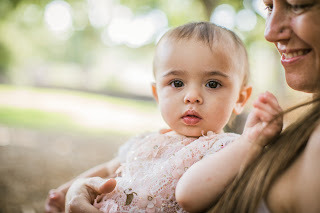 Serenity in my arms at her first birthday party
Serenity in my arms at her first birthday partySerenity: the state of being calm, peaceful, and untroubled. "Mom," my oldest son looked at me, concern surrounding him in a thick fog, contributing perhaps to the slow moving demeanor he appeared to have, "are you going to be okay? I have to take her to the hospital, are you staying or coming with us?" Oh, I wanted to go. I wanted to be with him and his wife as their second daughter was born, but by some terrible twist of fate I was dizzy, pasty, unable to stand. Practically passed out on the couch as my son ran from one room, taking care of his labouring wife, to another, asking questions of his unexpectedly faint mother. "Maybe get Dramma. She can be with you and I'll stay here with Nevaeh." My mom could go with them to the hospital, and I would stay here, sleeping alongside my oldest granddaughter who was oh so soon going to be a big sister. My son ran up the stairs to wake my mom. I stood shakily up from the couch and went to my daughter-in-law, rubbed her back a bit while she lumbered wide legged out of the tiny downstairs bathroom. The roaring noise in my head was overwhelming and I was grateful it could only be heard by me and was unlikely to wake the baby in the other room. Even the labouring mom was moving with more grace than I could muster, and though the sound in my head was distractingly loud I could tell she was doing a good job of keeping quiet. Quickly, my mom and son came down the stairs. Again I was asked if I was okay, and asked if I wanted to go to the hospital, but again I opted to stay home with Nevaeh. They promised to keep me in the loop, photos and updates would be sent, and away they went. With effort I moved my body toward the bedroom where Nevaeh slept. I saw her, there at the end of my fuzzy tunnel vision, tiny and sleeping on the big bed of her mom and dad's. A little baby, only one year old, about to become a big sister. Silently and carefully I crawled in beside her. I didn't want to wake her, but I had to feel her in my arms. I placed one arm over her and waited, she didn't move. I scooted my body closer to hers, I softly kissed her forehead, I felt myself drift peacefully to sleep. My phone was beside me on the bed, and I would open my eyes periodically to peek. Is she here? Is everything okay? It seemed things were moving along well at the hospital, and with each text or image that brought me closer to Serenity, I felt my body move closer to it's regular untroubled self. No longer feeling faint, simply bruised from it. Then, as Nevaeh stirred in my arms, in the wee early hours, I felt a true calm. I felt peaceful. I felt Serenity. My phone dinged. There she was. Beautiful! Here! Born in a room I where I was not but where my mom and son were. Beautiful! Nevaeh opened her eyes and looked at me with uncharacteristic softness. She is a sweet girl, but rarely is she calm and soft. She's almost always spunky and sassy. However, in that moment, she was serene. I showed her the picture and quietly announced, "There she is, Nevaeh. There's your baby sister, Serenity." Nevaeh reached out and touched my phone with all the softness in the world. Her tiny fingers traced the cheeks on my screen. They moved slowly, softly. Soft small sleepy fingers touching the screen displaying her sister. I was overcome with love for these girls. These sisters. I was grateful, oh so grateful, to be there in that room. In that moment. Watching big sister trace tiny fingers over baby sister, happy and calm. Peaceful and complete. I put the phone down as Nevaeh snuggled into me to fall back asleep. Dreaming, possibly, of her baby sister. Feeling, in my arms, like a gift. A gift on her sister's birthday. Serenity: a beautiful baby, a sister, a daughter, a granddaughter, a niece, born four years ago this day. Once morning arrived in earnest I brought Nevaeh with me to meet Serenity in the hospital. Serenity. There she was. It was a gift for me to share this moment - the moment of meeting Serenity - with my oldest granddaughter. The two of us having snuggled waiting for her, and now she's here. But I am also selfish. And I couldn't wait until my own moment, alone with Serenity. A moment I would get that night in the hospital. It was my turn. My son went home, my mom went home, Nevaeh went home, and I stayed. I chatted with my daughter-in-law, and walked the baby that night. Serenity woke up many many times, and I was fully there. Not faint. Yes, a bit tired, but oh so there. Serenity: my granddaughter, a child who helps me feel untroubled by the distance between us, calm in the certainty that we are not distant. It is my fate as a grandma to only sometimes be there. The day Serenity was born was my first time choosing so clearly not to be there. It hurt, but became beautiful too. Today Serenity turns four. Once again, I am not there. Oh, I want to be with her! I want to hold her, sing to her, talk about how stronger she is with her. (When I saw her last month she woke me up every morning to show me how stronger she is.
 ) But it is also beautiful where I am, who I am with. Hence, it's okay. Serenity knows I am there when I can be, and when it's the right choice for us. Well, she doesn't know, she's only four, but she feels it and I hope one day it will grow into a knowing. In the meantime, I will always be here for her. Wherever my here is, wherever her here is, she has me. Happy birthday sweet sweet Serenity! I love you! Hugs, smiles, and love!Autism Answers with Tsara Shelton (Facebook)
) But it is also beautiful where I am, who I am with. Hence, it's okay. Serenity knows I am there when I can be, and when it's the right choice for us. Well, she doesn't know, she's only four, but she feels it and I hope one day it will grow into a knowing. In the meantime, I will always be here for her. Wherever my here is, wherever her here is, she has me. Happy birthday sweet sweet Serenity! I love you! Hugs, smiles, and love!Autism Answers with Tsara Shelton (Facebook) "We write to taste life twice; in the moment, and in retrospect." ~ Anais Nin
July 6, 2022
Autism Answer: I Don't See What They See
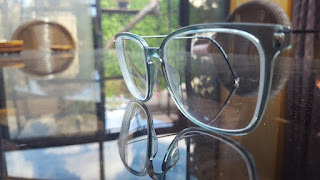 eye glasses on a glass table with out of focus furniture in the background
eye glasses on a glass table with out of focus furniture in the background
The kids all crowded around the game table—
Wait, I say kids and perhaps you imagine young children. The playful energy, adults necessarily nearby watching for mood shifts and play gone too far. You think of little voices, shy little ones, hyper boys ready to push.
But I’m referring to young adults. They are kids to us older adults who either birthed them, or are relatives of those who birthed them. Now that I’ve clarified, you picture similar but different people, right?
There is still the high energy, some are shy, maybe hyper boys pushing each other, but it’s different. Adults are watching in this case as well, but with less likely need to step in, though not none.
Did I mention alcohol?
Ah, maybe shift a bit again. There is alcohol. It’s a birthday celebration for the youngest cousin who is now drinking age.
There are about ten of them. Mostly girls, a few boys, all decked out in swim gear and sporting sun kissed cheeks, sun burnt shoulders here and there. The shy one isn’t overly shy, the boys not any more hyper than the girls. It is sunny, there is a pool near the game table, everyone is getting along, the older adults are fairly relaxed and enjoying the beautiful scene.
It is beautiful.
Should I, I’m honestly asking, describe beautiful people in order to ask you to picture the scene beautifully?
What color skin should they have? What sizes should their bodies be? What disabilities should I include, if any? Sure, you'll want diversity, but to what degree?
I was there and it was beautiful. I could clearly feel that. I enjoyed the range of conversations and energy styles. I loved noticing how some of the cousins reached out to newly introduced friends. How some sons and daughters delighted in a social opportunity of this sort.
It got a little less beautiful, in my opinion, with more alcohol.But, for several hours, it was all simply beautiful.
Kids and adults alike.
However, I ask in earnest regarding appearances of people because, I confess, I hardly noticed and I cannot accurately describe much of what they looked like.
Yet, at least one of the adults (in our older adult group) said enough things about physical appearances that I couldn’t help wondering, not for the first time, what don’t I see?
Comments wanting to become conversation on weight, skin health, ethnicity, and the like, were confusing me a little, giving me a feeling that I am missing something.
Yes, I do see our outsides. I see weight and color and skin. But it is a part so included in the whole that it’s not often specifically noticed. I am aware of the clues on our outsides that point to how we’re doing on our insides and so I don’t try to not see. Yet, for much of my life I’ve noticed - based on the comments of my peers - I am often not seeing what they are seeing. My mom has pointed it out to me a few times, so I know I’m not wrong. A room full of people can be commenting on how something or someone looks, and I often don’t see what they see. (Please note, I don’t mean only bad stuff. I’m not talking about gossipy comments, although I do mean those as well. I’m referring to simply noticing how people and things look.)
This sometimes feeds a worry of mine, about myself.
A little after the birthday celebration, a celebration where most of us were waltzing around in swimsuits, I was asked if I had felt comfortable, attractive even, at the gathering. Ummmm…. I felt hopeful that I was not too boring, wanting to be helpful but not get in the way, curious about these people – many of whom I was meeting for the first time – and their stories. Was I supposed to think, also, about appearance? About looking appropriately, I don’t know, good?
Oh, sure, when I first stepped into the yard wearing my swimsuit, my hair unwashed and sloppily ponytail-ed, I was wishing I’d shaved my legs and bikini line, wished my bathing suit wasn’t the wrong size putting me in the position of having to adjust it more often than I’d like. But I simply shrugged it off and stepped into the group hoping to add something beautiful. A listening ear, a helping hand, an interesting, maybe even funny, story or two.
I didn’t much see what I look like or what others look like.
I have wondered this before. Is being “body positive” more than being comfortable in my body? Am I missing something when I don’t much notice the differences, the variety of beauty? When I don’t see what they see?
And I have wondered often, did I embarrass someone? For lack of understanding, for not knowing what I don’t see, did I embarrass someone?
I know I sometimes do.
“Mom,” my youngest son once said in his usual thoughtful careful manner, “could you please come to my school event, but wear pants that don’t have so many holes in them?”
I don’t pretend to not see at all. I recognize a neat smile, eyes that are unique, an extra long beard. But, as I said, it is all part of a much bigger whole.
Books and covers, I was thinking about before sitting down to write this out. I do notice myself attracted to a book cover based on looks. If it looks like the type of texture that feels good in my hands, if it has colors and images that appeal to me, I notice. I think my attraction is in large part due to the experience of knowing which colors and styles are popular in my favorite genres. I see it and want to touch it, to know more about the story and feelings I might find inside. It is quickly more than the cover. As I read the hints and meaning represented on the cover reveal themselves. They change for me.
The kids, I guess, were like covers on books. People were looking at them and seeing more than I was because the other adults knew them better. They knew more of the stories inside and, hence, were able to recognize more meaning beyond the cover itself within the cover itself.
I saw them too, but not as much with my eyes. Hardly with my eyes. I guess, since kids are not books, there wasn’t the need to pick and choose which ones to pay attention to, which cover to reach out and hold. Their stories would simply reveal themselves and I was open to all the genres around me.
I do try to use seeing more, but I often get it wrong. My mom has noticed. She’s noticed for years. I don’t seem to see what others are seeing. My sister has noticed, too. When I have been watching her kids in her house and she comes home, she's learned to be careful not to immediately say, "I need to clean this house," because, most likely, I think I already did it for her. I often see clean, I often see not broken, when others see dirty and broken.
I don’t mind, mostly. This is not a huge issue and hardly worth exploring. But sometimes I worry that it means I am the reason everyone is feeling uncomfortable, and I don’t know it. Because I don’t see right, I might not know how wrong I look.
I don’t see quite the same as others so when I try, I worry I’m getting it wrong. The point is, to fix it I’d have to see what they see.
Here’s the rub, I mostly like not seeing. It is a newer discovery about myself. I like it. I like hardly noticing these things.
And it is hard to learn a new skill. So, maybe I also like liking it, so I don’t have to learn.
There is the risk of missing an important clue about a loved one or myself, a change in appearance that is a symptom in need of investigation. So far, though, others have been helpful in pointing these things out. (Recently, when a cat was losing weight but I hadn’t noticed, the problem was addressed, because other people noticed.)
So, for now, I think I like not seeing.
Do you see?
Hugs, smiles, and love!Autism Answers with Tsara Shelton (Facebook)June 9, 2022
Autism Answer: Quitting Lying Meant Learning The Truth
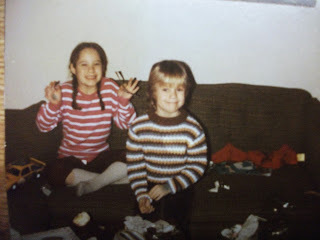 My sister and I (then)
My sister and I (then)My sister and I were tall-tale tellers as little girls. We loved to invent entire worlds of reality and put ourselves in important roles at the center of them. We shared some of these stories with friends and cousins, insisting we were truly as fascinating and valuable as our stories suggested. I don't know about my sister, but I honestly believed we were being believed. As we got a little older both my sister and I quit lying. If I'm remembering correctly, my sister did so in more of a slow weaning herself off way. Me, I quit cold turkey. As I would do with my unhealthy addictions later in life, I didn't try to balance it out or dabble when it made sense, I instead decided absolutely no. None. Never. Nope. Now, I have quite a few things this way. Makeup. Smoking. Alcohol. And with them it was less complicated than lying. Sure, I fell off the wagon a few times with those addictions also, but hardly. And quitting was, mostly, simple. Not so with lying. Partly, I suppose, because it was my first time quitting something. Partly, because it was a habit I had honed in all my environments. It had followed me everywhere. But, mainly, it was oh so challenging because to quit lying I needed to know the truth. But the truth - who I was, what I wanted, where my skills were - had largely been invented to impress. I hadn't taken time to figure out the truth and, in fact, hadn't thought it was of real value. I wanted to be like the stories I read and the songs that moved me. I wanted to be a story that made people feel, dance, change. So I tried to make me up as such. But lying, I had noticed, did not give me the feeling of those stories. Instead, it gave me the feeling of denying them. Of faking it. Of wanting to be an important story and desperately pretending. So I quit cold turkey. But I didn't stop. Sometimes, because I fell of the wagon. But mostly, because I didn't know the truth. I was trying, truly truly truly trying, to dig down to where I was, to where my beliefs and feelings and dreams were, so I could always tell the truth. Some I found easily, most I spent years and years discovering and tweaking. Lying, to me, felt like denying myself. Felt painfully duplicitous. I had a belief that being wise, which was something I wanted to be, and being kind, which was something I also wanted to be, and being a good influence on the world, something I extra badly wanted to be, especially as a parent, meant being authentic, in touch with my simple self, and learning to change, to grow different when that different was in line with what I believed was right. Hence, every lie - big or small - meant I was not wise, kind, or a good influence. It meant I didn't like me enough to say what was true. And since I am me it doesn't make any sense whatsoever to be someone I don't like. I have the power to be a me I like and not doing so is cowardly. I am now sometimes honest to the point of ridiculousness. It can be challenging for me to give a simple question a simple answer because I'm in the habit of taking ten hours to follow all my thoughts to the core of the truth of the answer. People are often sorry they ever asked me, "What song are you in the mood for?" And I still sometimes lie. I recently said, "I don't have to pee badly, we can keep going," when I really did have to pee badly but I didn't want to make our group stop to pee. And yes, worse lies too. Not even all that long ago. But I then told the truth. I don't like lies. For me. However, interestingly, I don't worry much about lies others tell. I would rather people tell me the truth but mainly because it's more relevant and insightful to build on honesty. And where my children are concerned I hope for the truth more because I want so badly for them to feel they can be truthful with me. I can't know what it means to others, lies and lying. So if they are lying it isn't for me to say how good or bad that is. I'm fine working with what I'm given.
But me? I can't allow lies from me. When they happen, and they do, I get to work figuring it out; seeking the truth, exploring the reason I lied, making necessary changes, and telling the truth.My sister and I told some interesting tales when we were little. If you remember a couple of girls wearing pretty nightgowns to school and explaining it was because we were angles from heaven here on earth to take notes and report back, and these pretty nightgowns were our heavenly attire, well, nice to see you again! But now we both work at living our lives with truth. In line with our beliefs, values, personalities, and preferences. Which, we've discovered, is not only more comfortable and pretty, but also far more fascinating. There are more layers, more sensational stories, in discovering and living our own truths than either of us could have ever imagined! And guess what? That's the truth. Hugs, smiles, and love!!!Autism Answers with Tsara Shelton (Facebook)
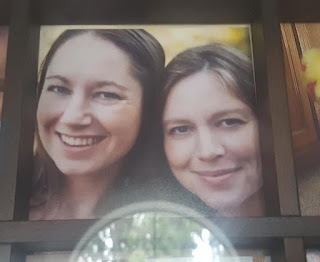 My sister and I (now-ish)
My sister and I (now-ish)


